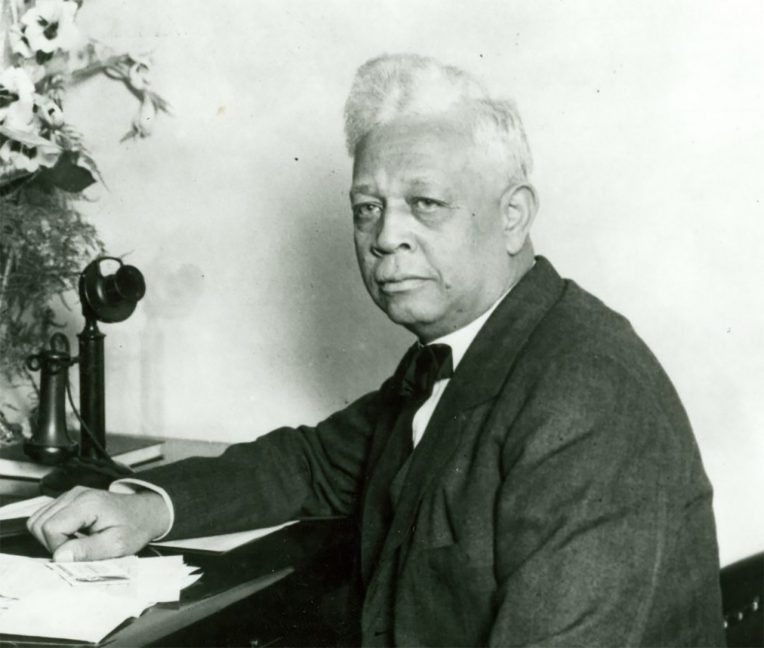Dr. Calvin White Jr., of the J. William Fulbright College of Arts and Sciences at the University of Arkansas, Fayetteville, delivered a virtual keynote address for Black History Month on February 26. The talk, “Oscar S. De Priest: A Black Congressman in Jim Crow America,” was sponsored by the Department of History and by African American Studies at Illinois State University.
In his introduction of White, Illinois State History Professor Dr. Touré Reed noted that White’s research “focuses primarily on African Americans in the American South.” White, who is currently at work on a biography of De Priest, first became aware of his subject while doing research as a graduate student.
“I was interested in the migration of Blacks leaving the American South and settling in these urban northern cities, and I found that De Priest was the first African American alderman in the country,” White said.
De Priest, who was born in Alabama in 1871 to former enslaved people, would go on to serve three terms in Congress (1928-1935) representing Illinois’ 1st Congressional District, which encompasses a large part of the South Side of Chicago. His victory over a white man ended a 28-year absence of Blacks serving in Congress. White described De Priest as a pioneer in early 20th-century American politics who paved the way for many other Black politicians, including one who would become president.
“Before there is Barack Obama, there is De Priest,” White said. “He operates at a very sophisticated level in every sense, and he lays the foundation so that those who follow can be accepted as Black political leaders.”
“Before there is Barack Obama, there is De Priest.”
—Dr. Calvin White Jr.
White, who spoke for almost an hour before taking questions, said that for this and other reasons, he believes that De Priest is worthy of national attention that he has not received.
In his talk, White said his work challenges the historiographical view that Blacks who served in Congress during the late 19th and early 20th centuries left no legislative record or lasting impact.
“I argue quite the contrary,” White said. “De Priest presented himself as a representative of all African-Americans supporting public policies and legislation that could better Blacks’ lives both socially and economically.
As the lone Black voice in Congress, De Priest continued to fight for civil rights at the highest governmental levels during the 1920s and early 1930s, White said, and was known as the “Negroes’ Congressman.” He was portrayed in the white press as “uppity” while he was seen as a hero by the Black community and the Black press.
De Priest also felt the sting of racism in the halls of Congress as members didn’t want to locate their offices next to his, with the exception of New York’s Fiorello La Guardia, who protested and was De Priest’s office neighbor for all three of his terms.
His efforts on behalf of the Black community made him “one of, if not the most important, Black political figure of the early 20th century America,” according to White. While in office, De Priest argued civil rights and segregation in the press with President Herbert Hoover, both sparred and partnered with Black activist Ida B. Wells, and along the way became known nationally.
De Priest’s lost his congressional seat in 1934 to Arthur Mitchell. It marked the first time two Blacks ran against each other for a national office, and Mitchell became the first Black man elected to Congress as a Democrat.
White described De Priest as a complicated and complex man but did not paint him as a saint, saying that he operated as “a true politician” who represented the good, the bad, and the ugly of Chicago politics.
“He was doing a lot of good and willing to make political deals—this is Illinois politics after all,” White said. “He was trying to make real change for African Americans.”
In 1951, De Priest was 80 when he stepped off a curb and was sideswiped by a bus, which led to his death weeks later. He passed with little fanfare, White said, adding that his death marked the end of one of the greatest political careers and eras of racial advancement for Blacks in American history.
White credits De Priest with creating a bridge from the 19th century to the 20th century that future Black political leaders benefited from. Without De Priest, White said, there would be no Mitchell, no Charles Diggs from Michigan, and no Adam Clayton Powell from New York, all of whom were Black and served in Congress after him.
“And, without De Priest,” White said, “There may not even have been a Barack Obama.”


